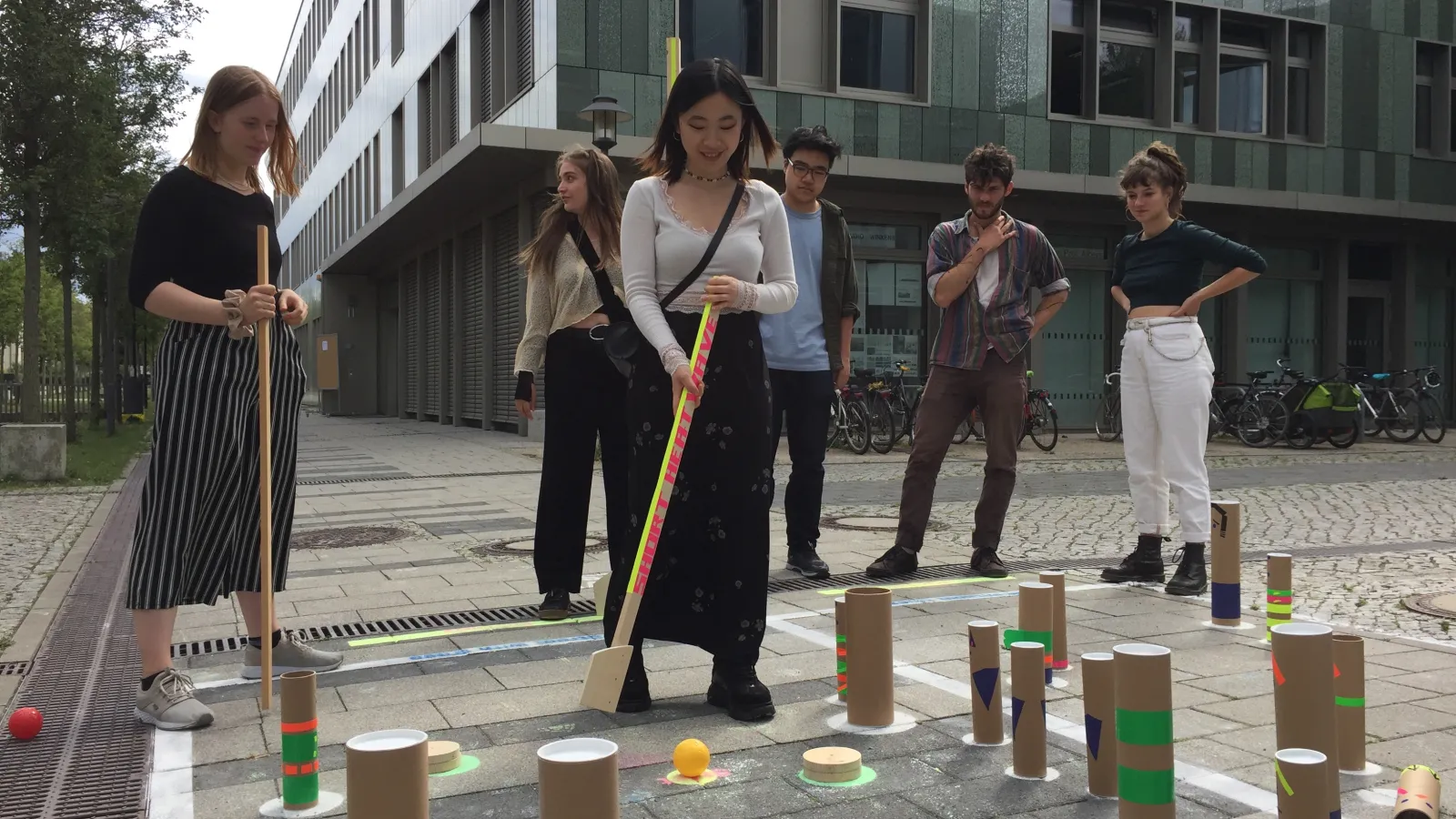Int'lFlex Course "Climate Community Street Play" with Visiting Academic Ruttikorn Vuttikorn
Visiting academic Ruttikorn Vuttikorn reflects on her stay in Potsdam and her findings from the Int'lFlex course, initiated by the Department of Design.
Video interview with Ruttikorn Vuttikorn
In the interview, Ruttikorn Vuttikorn talks about herself and her professional career. She describes the process and impressions of arriving in Potsdam. She talks about the differences she noticed from her home institution, how she felt about the teaching and cooperation at the University of Applied Sciences Potsdam and what the students' learning effects and reactions to the international insights the course offered were. The Int'lFlex course was funded by the third-party project "FL2@Int'lFlex - Research-based Teaching and Learning in an International Context Project" to support the internationalisation of the University of Applied Sciences Potsdam through cooperation with international partners.
Summary by Myriel Milicevic
The topic in the Climate Community Street Play course relates to the risks and impacts of climate change in urban spaces and the relevance of local communities to organise and take action together. After research and personal exchange in the Sprengelkiez neighbourhood in Berlin-Wedding, we developed street games with students. These are intended to inform about the correlations and encourage people to take action. The topic is globally relevant with very different circumstances locally. The idea behind the course was to look at the connection of these local challenges in a global context - in this case South East Asia. The expertise of the guest lecturer Ruttikorn Vuttikorn was particularly valuable here, as she has many years of experience in Disaster Preparedness workshops and designing games that are adapted locally in each case.
The expectations of bringing together the contents, methods and formats in the course and illuminating them interculturally were completely fulfilled. This was confirmed both by the positive feedback from the students and by the interest in the results from participants in the Sprengelkiez and other districts. The teaching skills of the guest lecturer Ruttikorn Vuttikorn were seamlessly integrated into the teaching and work with the design students. Co-teaching has been a continuously enriching process for all, from preparation to course progression, documentation and current development.
In the course, the students not only gained insights into different cultural approaches and problems in dealing with climate change, but were in turn able to sharpen their view of their own local situation from the outside. Street games are a global format and can form a common language. Here, too, there was a lot of input and exchange, which could only be stimulated so intensively and substantially through the experiences of the guest lecturer. Individual students with Asian roots had a particular interest in obtaining these perspectives in their studies. Despite the reservations of individual students, English as a course language was ultimately perceived as a great enrichment and gain in competence.
The course took place exclusively in person and, in addition to the regular course units, included a public symposium as well as game events in the Sprengelkiez and on the university campus. The encounter with local participants and residents was of great importance for this course. This allowed people outside the university to benefit from the intercultural and participatory format of the Int'lFlex course. The symposium broadened the international focus on the topic of "Climate Change in Urban Space": In addition to Ruttikorn Vuttikorn's lecture on Southeast Asia, there were contributions on European and South American case studies.
The presence of Ruttikorn Vuttikorn was visible beyond the course. The introductory event was held jointly with the course "Gaming for Sustainability" by Prof. Judith Ackermann and Rebecca Freitag at the Department of Social and Educational Sciences. In addition to teaching the Int'lFlex course, Ruttikorn Vuttikorn was always the contact person for students interested in topics on the Southeast Asian region and game design.
In Prof. Silvia Knüppel's course "Pause", she gave a specially created lecture on the culture of breaks in various Asian countries. In addition, Ruttikorn Vuttikorn also repeatedly took part in events at the university and broadened the discourse and perspectives on design for students and teachers with lectures or through informal encounters. For the department and for me personally, contacts to Thailand were intensified with the already existing partnership with the School of Architecture and Design at KMUTT in Bangkok. As a result of the course, the first student in the Design Department has now decided to spend a semester abroad at KMUTT. During my research semester in 2022/23, I will run the Climate Community Street Play course again in Bangkok together with Ruttikorn Vuttikorn and design students from KMUTT. The parallels and differences with Berlin are particularly exciting here. Both courses and their results are to be documented and further developed. The topic of Climate Community Street Play and the cooperation is not finished here, but will continue.








